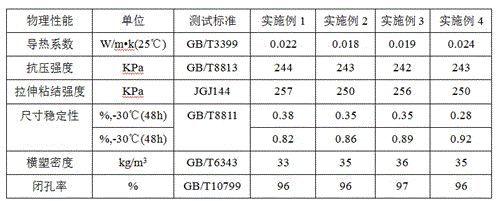Rigid foam polyurethane thermal insulation material
A technology of rigid polyurethane foam and thermal insulation materials, applied in the field of rigid polyurethane thermal insulation materials, which can solve problems such as lack of active hydrogen, foam and shell shedding, shell deformation, etc., achieve excellent compressive strength and avoid deformation of the water tank
- Summary
- Abstract
- Description
- Claims
- Application Information
AI Technical Summary
Problems solved by technology
Method used
Image
Examples
Embodiment 1
[0033] First prepare polyether polyol I, the process is as follows:
[0034] (1) Weigh 80g of lignin, 40g of water, 5g of lignin peroxidase, 1g of catalase, 1g of furfural acetaldehyde and 5g of furfuryl alcohol in a reactor, the reaction temperature is 80°C, and the reaction is stirred for 5 hours to obtain Enzymatic modification of lignin;
[0035] (2) Mix 100g of enzymatically modified lignin, 300g of glycerol, 200g of diethylene glycol and 0.03g of Pd-Fe catalyst in the reactor, control the reaction temperature at 120°C, and bubble the reaction with nitrogen from the bottom of the reactor , and then vacuumized, 8 g of propylene oxide was added, and the reaction was sealed under normal pressure for 2 hours to obtain the polyether polyol I with a functionality of 4.6 and a hydroxyl value of 400 mgKOH / g.
[0036] Then prepare polyether polyol II, the process is as follows:
[0037](1) Weigh 40g of ethylene glycol and 3g of magnesium chloride into 200g of peanut oil, control...
Embodiment 2
[0041] First prepare polyether polyol I, the process is as follows:
[0042] (1) Weigh 50g of lignin, 30g of water, 3g of lignin peroxidase, 2g of catalase, 3g of furfural acetaldehyde and 10g of furfuryl alcohol in a reactor, the reaction temperature is 80°C, and the reaction is stirred for 5 hours to obtain Enzymatic modification of lignin;
[0043] (2) Mix 100g of enzymatically modified lignin, 250g of glycerol, 100g of diethylene glycol and 0.01g of Pd-Fe catalyst in the reactor, control the reaction temperature at 120°C, and bubble the reaction with nitrogen from the bottom of the reactor , and then vacuumized, adding 4 g of propylene oxide, and reacting under normal pressure for 2 hours to obtain the polyether polyol I with a functionality of 5.0 and a hydroxyl value of 400 mgKOH / g.
[0044] Then prepare polyether polyol II, the process is as follows:
[0045] (1) Weigh 20g of ethylene glycol and 1g of magnesium chloride into 100g of peanut oil, control the reaction te...
Embodiment 3
[0049] First prepare polyether polyol I, the process is as follows:
[0050] (1) Weigh 100g of lignin, 50g of water, 2g of lignin peroxidase, 3g of catalase, 8g of furfural acetaldehyde and 6g of furfuryl alcohol in a reactor, the reaction temperature is 80°C, and the reaction is stirred for 5 hours to obtain Enzymatic modification of lignin;
[0051] (2) Mix 100g of enzymatically modified lignin, 350g of glycerol, 250g of diethylene glycol and 0.05g of Pd-Fe catalyst in the reactor, control the reaction temperature at 120°C, and bubble the reaction with nitrogen from the bottom of the reactor , and then vacuumized, 10 g of propylene oxide was added, and the reaction was sealed under normal pressure for 2 hours to obtain the polyether polyol I with a functionality of 4.7 and a hydroxyl value of 410 mgKOH / g.
[0052] Then prepare polyether polyol II, the process is as follows:
[0053] (1) Weigh 50g of ethylene glycol and 5g of magnesium chloride into 300g of peanut oil, cont...
PUM
 Login to View More
Login to View More Abstract
Description
Claims
Application Information
 Login to View More
Login to View More - R&D
- Intellectual Property
- Life Sciences
- Materials
- Tech Scout
- Unparalleled Data Quality
- Higher Quality Content
- 60% Fewer Hallucinations
Browse by: Latest US Patents, China's latest patents, Technical Efficacy Thesaurus, Application Domain, Technology Topic, Popular Technical Reports.
© 2025 PatSnap. All rights reserved.Legal|Privacy policy|Modern Slavery Act Transparency Statement|Sitemap|About US| Contact US: help@patsnap.com

